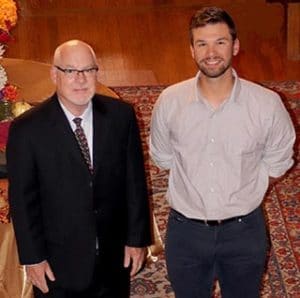Davis & Elkins College and California University of Pennsylvania (CAL U) have partnered to offer undergraduate criminology students a clearer path to obtaining a master’s degree. As part of a pilot project this fall, one D&E senior is already earning credit hours that will apply to the graduate school program.
According to the agreement, D&E students can transfer six credits from their criminology bachelor’s degree program to CAL U’s master’s degree programs in criminal justice studies: applied criminology or forensic linguistics. To be eligible, students must maintain a 3.0 GPA. Faculty and administration from both institutions will work together to provide guidelines for students interested in participating in the program.
Davis & Elkins senior Justin Wisniewski has provisional acceptance into the CAL U program for fall 2022. The Buffalo, New York, resident and member of the Senator baseball team was selected for the pilot project by his academic advisor Instructor of Criminology Ronda Engstrom, who cited his exemplary research paper and strong work ethic.
“I’m grateful to Professor Engstrom for taking the initiative to develop this agreement,” said Provost and Vice President for Academic Affairs Dr. Rob Phillips. “We’re very happy to be collaborating with CAL U, as the quality and focus of their criminology programs is a good match for our students’ strengths and interests. It also provides a ‘head start’ on graduate school for students like Justin, which has both academic and financial benefits.”
Earlier this year, Wisniewski completed a three-credit hour internship with the West Virginia Department of Rehabilitation and Corrections. This spring, he will earn three credits for his senior thesis after collecting data related to his internship. Full credits from both projects will transfer to CAL U and count toward Wisniewski’s graduate degree.
“Since he’s already ahead, this alleviates the amount of tuition costs and the time it will take to complete his master’s degree,” Engstrom said.
Wisniewski plans to work – hopefully in the criminal justice field – while attending classes. The courses for CAL U’s master’s program are all online and students are enrolled on a part-time basis that follow fall, winter, spring and summer terms. With a projected graduation date of fall 2023, Wisniewski hopes to work in crime analysis or as a detective.
This fall, he got to meet Dr. John Cencich, the CAL U professor who crafted the master’s program and will serve as one of Wisniewski’s instructors. Cencich is known internationally as a former senior United Nations war crimes investigator. At D&E, he presented a public lecture that focused on his work with the International Criminal Tribunal for the former Yugoslavia and how their efforts resulted in the indictment of then-Serbian President Slobodan Milosevic.
“When Dr. Cencich was here, I was enamored with his line of work,” Wisniewski said. “His presentation motivated me more. If I can do anything even similar to his work, I will have the career I want.”
Wisniewski plans to focus his master’s degree studies on applied criminology. The program presents advanced criminological theories and examines the behavioral manifestations of violent offenders. Students build a strong foundation of theoretical knowledge in criminology, develop research skills and apply this theoretical framework to real-world situations involving criminal investigative analysis, equivocal death analysis and geographical crime analysis.
CAL U criminal justice graduate students may also select a concentration in forensic linguistics. Students in the program build a strong foundation of theoretical knowledge and research skills as they learn to examine and assess threatening communications, fraudulent documents and other writings associated with serious criminal, civil and national security matters. Then they apply that theoretical framework to real-world situations requiring forensic linguistic training and skills.
“I am very thankful to Professor Engstrom and the Criminology Department for allowing me this opportunity,” Wisniewski said. “She introduced me to this master’s program and piqued my interest. Before that I didn’t have plans of attending graduate school, but she opened my eyes. I really owe a lot to her and I am very appreciative.”

Davis & Elkins College senior Justin Wisniewski, right, meets with Dr. John Cencich, professor and director of the Pennsylvania Center for Investigative and Forensic Sciences at California University of Pennsylvania, at a reception in Graceland. Wisniewski is participating in a pilot program for a partnership between D&E and CAL U that gives D&E students an opportunity to apply six undergraduate credits toward their master’s degree at CAL U.

